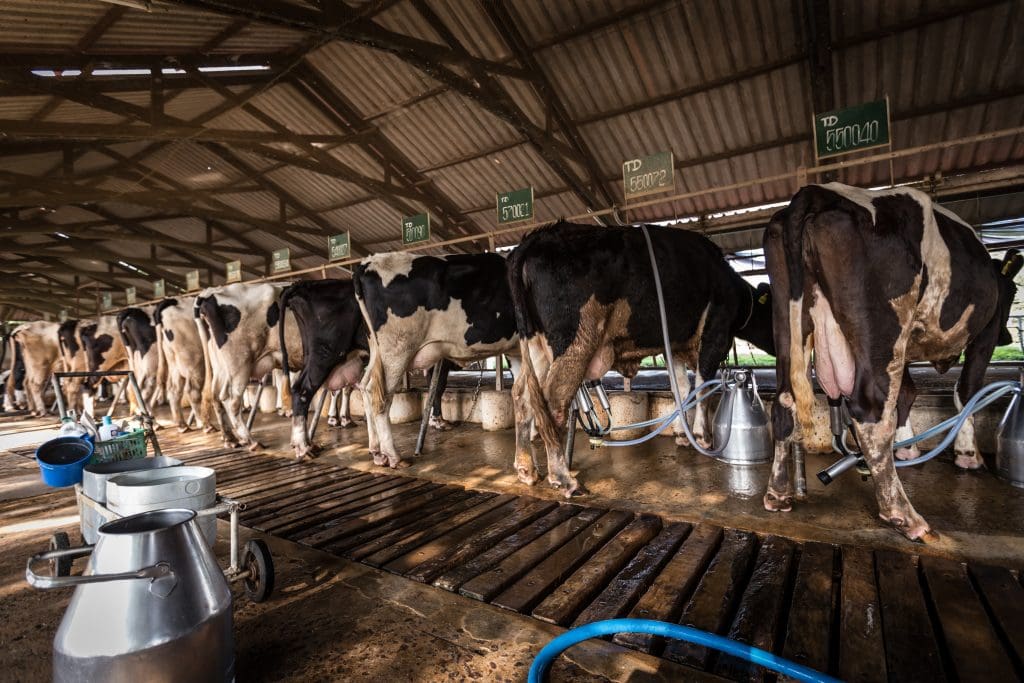Imagine a tranquil countryside with cows grazing peacefully and a red barn nestled amidst lush green fields—a scene often romanticised as the essence of dairy farming. However, beneath this idyllic facade lies an industry fraught with environmental harm, animal cruelty, and health concerns. Dairy production contributes to deforestation, greenhouse gas emissions, and the exploitation of animals while raising questions about its necessity in our diets. With plant-based alternatives offering sustainable, ethical solutions that prioritise animal welfare and environmental preservation without compromising nutrition, it’s clear that rethinking our reliance on dairy is not just possible—it’s essential for a kinder future
Picture a serene countryside with rolling green pastures, cows grazing peacefully, and a charming red barn in the distance. The idyllic image invokes a sense of nostalgia and warmth, often associated with dairy production. However, behind this picturesque facade lies an industry riddled with ethical concerns and detrimental consequences. It’s time for us to take a closer look at the ethical implications of dairy production and consider why saying goodbye might be the right choice.
The Dark Side of Dairy Production
While dairy products have become a staple in many households worldwide, it’s essential to consider the environmental impact and animal welfare issues associated with their production.

Environmental Impact
The demand for dairy products has led to alarming consequences for our planet. Massive areas of land are cleared for pasture, contributing to deforestation. Additionally, the greenhouse gas emissions resulting from dairy production significantly contribute to climate change. In fact, the dairy industry is estimated to be responsible for 4% of global greenhouse gas emissions. These figures highlight the urgent need for change.
Animal Welfare
Behind the scenes, the lives of dairy cows are far from the serene image we often envision. Artificial insemination is used to maximize milk production, resulting in repeated pregnancies and separation from their calves shortly after birth. The emotional distress and suffering endured by dairy cows in large-scale factory farms cannot be ignored. Furthermore, these cows are subjected to incredible physical strain, resulting in health issues such as mastitis and lameness. It’s time to acknowledge the ethical imperative to treat animals with compassion and respect.

Health Concerns Linked to Dairy Consumption
Many of us have grown up with the belief that dairy is an essential part of a healthy diet. However, recent research suggests that dairy consumption may pose various health concerns.
Lactose Intolerance and Dairy Allergies
An estimated 65% of the global population has difficulty digesting lactose, the sugar found in milk. This lactose intolerance often leads to uncomfortable symptoms such as bloating, diarrhea, and gas. Additionally, some individuals suffer from dairy allergies, which can manifest in severe reactions. The prevalence of these conditions raises questions about the necessity of dairy in our diets and the inclusivity of an industry that caters predominantly to lactose-tolerant individuals.
Controversial Health Benefits
Contrary to popular belief, consuming dairy products does not guarantee optimal bone health. In fact, some studies suggest that dairy intake may have no significant impact on fracture risk. Furthermore, there is evidence linking dairy consumption to acne and various types of cancer. These controversies and associations underscore the need to critically assess the claims we’ve been told about the health benefits of dairy.
Plant-Based Alternatives: A Sustainable and Ethical Choice
The good news is that we are not left with an empty glass when we choose to say goodbye to dairy. Plant-based alternatives offer a sustainable and ethical choice that aligns with our values.
Nutritional Adequacy
Contrary to the dairy industry’s messaging, plant-based alternatives can provide all the necessary nutrients. Plant milks, such as soy, almond, and oat milk, are often fortified with essential nutrients like calcium and vitamin D, making them just as nutritious as cow’s milk. With a growing range of options available, there’s no shortage of alternative choices to explore.
Environmental Benefits
Choosing plant-based milk significantly reduces our carbon footprint and contributes to environmental preservation. Compared to dairy production, plant-based milk production requires significantly less land, water, and energy. Opting for plant-based alternatives can lessen deforestation, conserve water, and mitigate climate change. By making a small change in our daily routine, we can collectively make a big impact.
Ethical Animal Treatment
Moving away from the exploitation of animals for milk production is not just a decision for our own health and the environment—it’s a compassionate choice. Supporting cruelty-free and vegan alternatives ensures that no animals are subjected to the suffering and confinement often associated with dairy farming. By embracing these alternatives, we contribute to a world that values animal welfare and respects the lives of all beings.
In Conclusion
As we consider the ethical implications of dairy production, it becomes evident that it’s time to bid farewell to this once-beloved staple. The environmental impact, animal welfare concerns, and potential health risks associated with consuming dairy products are significant factors to consider. Fortunately, there is a growing array of plant-based alternatives that provide the nutrition we need while aligning with our moral compass. By making the switch to these alternatives, we can actively contribute to a more sustainable, compassionate, and healthier future for all.
4.4/5 - (16 votes)



